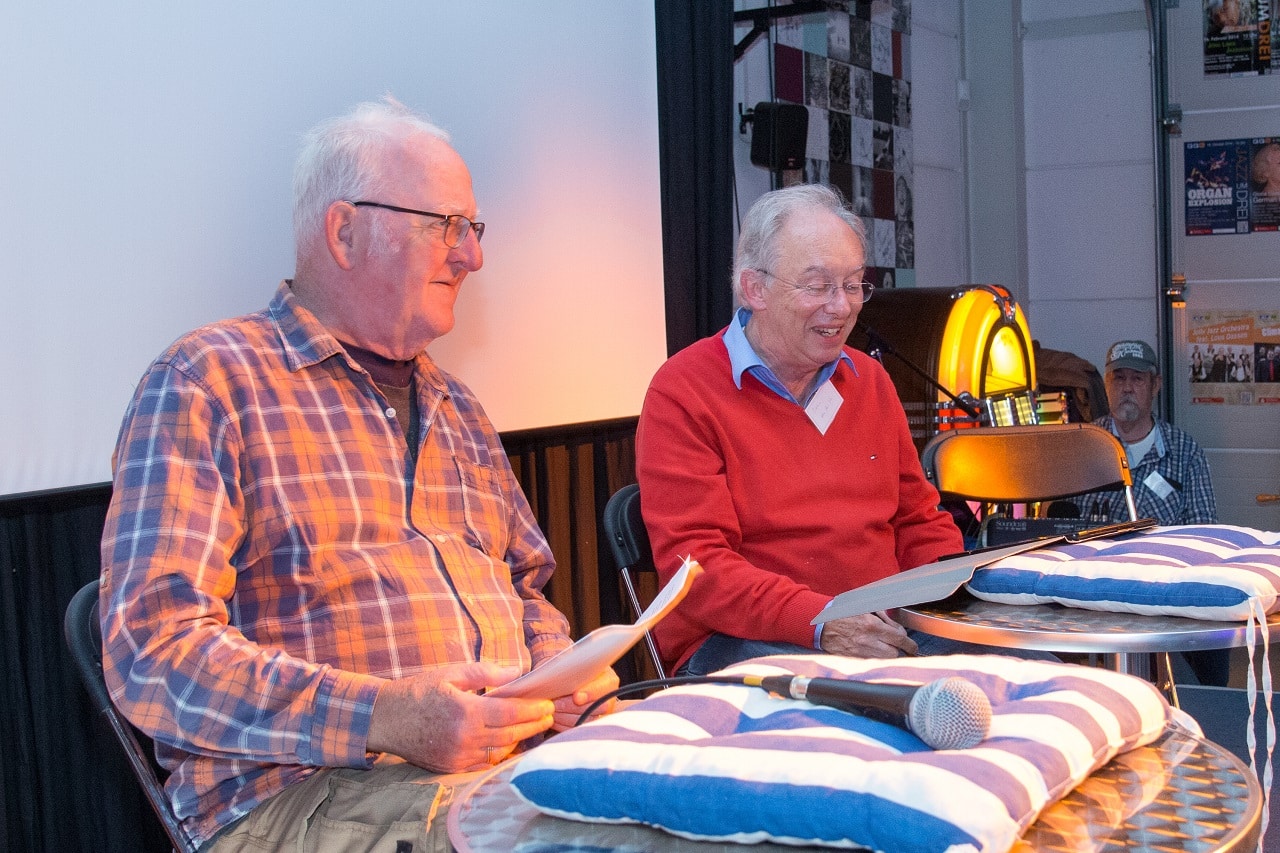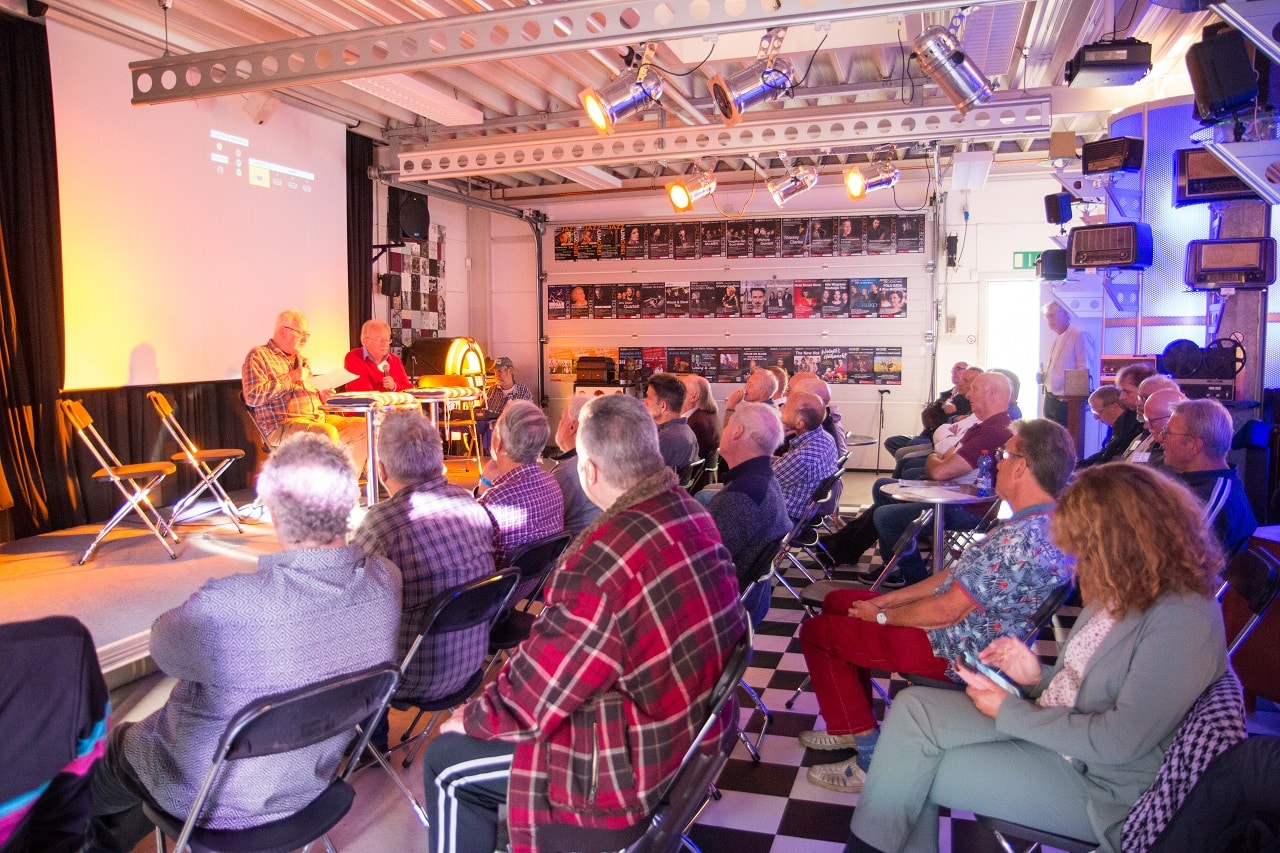During the 22nd Erkrather Radio Day in Hilden Hans Knot was interviewed by Martin van der Ven with some additional questions by Jan Sundermann
Martin: You’ve written so many books on the subject of the offshore radio stations, and by now 277 International Reports have been published online. Are there still “untold stories”?
Hans: Well when an international radio report is published in several fb groups on our common site Offshore Radio Nostalgia and Mediapages as well as RadioVisie response is coming in the same day. At the moment there is more material direct available for three thick issues of the report. So yes there are untold stories, questions from readers and memories to share.
Martin: How many interested people do you send the International Report to, and how many members does the SMC Newsgroup have on Facebook? How would you estimate the number of people interested in the topic across Europe?
Hans: Next to the mentioned way of promoting the international radio report goes out to about 3000 readers by e mail. I’m running currently the SMC Group as well as the Mi Amigo 1974-1978 group on FB. The first one is a younger one and has almost 2000 followers, the Mi Amigo group has more than 2800 members. Also I have my own pages where also radio related issues are mentioned and where 3.700 followers are. The number of people outside Europe is difficult to count but surely a few hundred. Whereby USA, Canada, South Africa, Australia, New Zealand and the Far East Asia have members in the SMC Group.

Martin: Recently, I’ve read several reports from you about failed offshore projects. Which ones do you find the most interesting?
Hans: Without going into details I want to mention a few like the failed project Radio Center, which was planned for Swedish listeners. Very interesting to explore was Radex Radio and TV in 1965 which was planned for the Midlands, East Anglia, West Country. Of course I never thought a tv project from a ship would be successful. As third one I want to mention the Oterm, Onafhankelijke Televisie Exploitatie en Radio Maatschappij. It was around 1970 a lot of information was in the newspapers but the planned station never came on the air. All full details can be found on our Offshore Radio Nostalgia info Radio Pages
Martin: Only a few offshore stations were primarily political or religious in nature (Arutz Sheva, Radio Brod, Radio Free America). How do you explain their limited success compared to the commercial pop stations? Déesse de la Démocratie failed before broadcasts even started.
Hans: Of course there’s a total difference between the pop stations and those mentioned. Commercial pop stations focused on popular music and entertainment, which had broad appeal to mass audiences, especially younger listeners looking for alternatives to state-controlled media or mainstream programming.
Political and religious stations, however, typically catered to niche audiences with specific ideological, political, or religious views. The limited audience size naturally constrained their reach and potential popularity. For example, people who were not interested in the specific political or religious messages of a station had no reason to tune in.
Martin: Despite the many books that have been written about offshore radio stations, there is still no biography of Ronan O’Rahilly. We are hearing more and more critical, sometimes even damning, comments about this controversial figure. In particular, Peter Moore has brought some anecdotes to light that do not paint him in a good light. What is your view of him, and do you think such a book will ever be published?
Hans: Ronan O’Rahilly’s life and legacy are rich with both inspiration and controversy, it will be important for such a biography to balance the romanticized version of O’Rahilly as a visionary with the more critical accounts of his behavior. Of course there are many stories from which you can conclude that O’Rahilly was not only a complex figure but had also a very black site. There a many former deejays who can tell about where the money, for instant from the many religious programs in the late seventies, went to. Indeed not for tendering the radio ship Mi Amigo. Personally I think we must do with all those books which have been written and decide to the readers what to believe or not to believe.
Martin: Thirty-four years after the end of Radio Caroline, the legendary station is still on the air, now online and via DAB. Many former offshore radio DJs are still enthusiastically involved, especially with the monthly broadcasts live from the radio ship. How do you assess the current broadcasts? Do the medium-wave broadcasts on 648 kHz make sense?
Hans: I must admit that I almost never listen to the internet version or the AM service. The only times I enjoyed listening when there is a special weekend like earlier this year from the seventies and eighties. And listening is then when received the links from radio friends, who recorded the shows. For the rest radio listening in these days is when there are life broadcasts from my favorite Football team. For the rest there are many historic radio shows still to explore.
Martin: The MV Ross Revenge, Jenni Baynton, and Norderney are the last remaining radio ships that can still be visited in Western Europe. What do you see as the future of these ships? Was an opportunity missed in the past decades, or would a museum ship have had little chance of survival?
Hans: Of course maintaining these ships in good condition is costly. Preservation efforts require ongoing funding, technical upkeep, and logistical planning. The success of any future efforts would depend heavily on support from enthusiasts, radio history buffs, and potentially government or cultural grants for historic preservation. But we must not forget that, look around in this room, we all are getting older and I don’t see the next generation stepping in to save those radio ships against high costs
Martin: Why did the 192 Museum in Nijkerk fail after such a short time? What do you think is the future of Museum RockArt?
I don’t think the 192 museum failed and in my opinion it was for the organizing team from the beginning clear they only wanted to be open for a short period. Also Museum RockArt is depending on people who do it free of payment. Mostly older people and I hope that Rock Art will get a good place as a Museum in the Hague or Scheveningen with good grants from the government. However with the new plans for cultural grants I doubt this will happen.
Martin: What do you advise us older folks: how should we handle our “treasures” when we are no longer here one day?
Hans: When we are no longe here we can’t do anything. But in my case I have a hugh archive and have made it clear by a document which parts of the archive has to be preserved and where these have to go. I hope it will take a very long period before this will happen
Martin: Looking back on the past 60 years: what do the offshore radio stations mean to you in retrospect? Have they become a central theme in your life?
Hans: Radio surely is one of the central themes in my life with a special heart for the offshore stations, but the most central theme is the love for my wife Jana and the rest of our family. And at 75 I’m sill a bit active for the university in Groningen so I do enjoy life a lot.

Questions from Jan Sundermann:
Jan: In some viewpoint, offshore radio attracted strange characters to do business there. In other viewpoint, it was also a mirror of society. In case, some shipmates never got their feet back on the ground when again on shore. Some lived on with unemployment and social welfare. And some just became millionaires.
Hans: You can compare offshore radio to any other form of business. In every business, there are the executives who are often prevented by circumstances from being promoted or eventually dismissed and do not have the success of other colleagues who have special strengths that allow us to make great strides forward and eventually become financially independent.
Jan: Recently (July 8th, 2024) was a small article in German newspaper Rheinische Post mentioning 60th birthday of Linda de Mol. Mentioning her father as a former Schlager singer, and her brother as the known successful media company owner (not mentioning RNI). So John de Mol jr., had he ever taken notice of events like the Amsterdam Radioday? The ‘rich kid in town’, does he remember where at least some of the families success did come from?
Hans: When it comes to the organization of RadioDays in the Netherlands, I can state that the thought never occurred to Rob, Martin and me to ask John de Mol Jr. to contribute. There is no reason for this, perhaps it has to do with the fact that he played a minor role within the Radio North Sea organization and was seen more as the director’s son,
As for John de Mol sr., I myself had some less friendly contact in the period before Jacob van Kokswijk and I got permission in 1972 to engage in the production of the RNI double Lp, which saw the light of day 51 years ago. On the one hand, he was of the opinion that we were spreading too much information about the station in Pirate Radio News. A magazine that could actually be seen as the forerunner of the International Radio Report. But he also sent nasty comments about the fact that we showed our faces too often in the studio complex, although this was not the case.
So later, partly in view of the activities concerning the LP, things became more convivial. Many do not know, for example, that preparations for the Abominable Top 2000, the predecessor of the Dick voor Mekaar Show, were done in Jacob Kokswijk’s studio in Leiden.
Over the years I have seen De Mol sr. appear only once after 1974 at a radio related event and that was a special RNI broadcast of 192 Radio in Hilversum.
Jan: Regarding Tony Allan: during the birthday event at Southend in 2004, he made a very engaged speech, claiming that he never met Tony Benn. Nobody of various governments ever was looking to speak with the offshore radio people?
Hans: It was, of course, a political struggle by various governments against and regarding the activities of the offshore broadcasters. Benn and many other leaders have always expressed their dissatisfaction through the media. In the vast SMC newspaper clipping archive, there are countless statements made in which particularly the gentlemen politicians strongly opposed the activities of the offshore broadcasters. This is also evident when film footage from that time is viewed, in which government spokespersons were questioned. In the Netherlands, April 18th, 1973 is certainly a clear exception when the then-government under Prime Minister Den Uyl did allow people involved with offshore broadcasters—whether directly or indirectly—to express their opinions during an event in Parliament.
Jan: The Panama Papers: did somebody find there any notices related to offshore radio companies? Probably these documents are all too young to cover any such information?
Hans: In the archives of the British government, there are numerous documents that reference contacts with Panamanian governmental agencies as well as those from other countries. Additionally, in the archive containing newspaper clippings, compiled in collaboration with Offshore Echos, many articles can be found regarding the registration or lack thereof of certain broadcasting ships.
